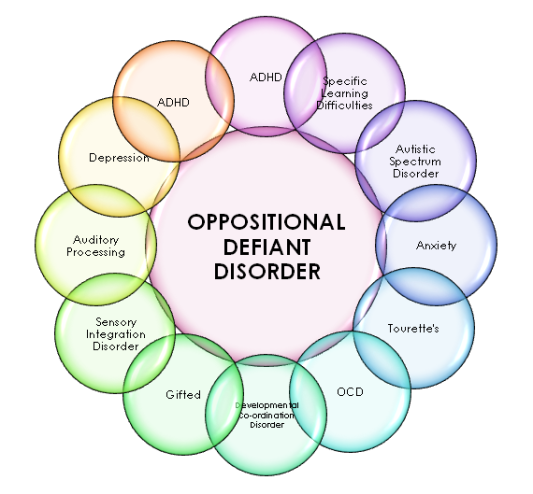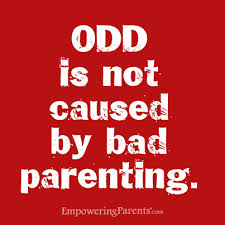~~February 28, 2015~~
I never had any children of my own. However, at this time in my life, I have been part of the care giving of four grandchildren. And I have learned a lot …. this is one of the issues we seem to be dealing with at this time.
I’ve been researching and find it very surprising that, in spite of being in the medical field, I wasn’t aware of this disorder. I’ve never found myself in this type of situation.
As I search for information, it seems to be that there are many families out there who could be dealing with this disorder.
~Oppositional defiant disorder~
(ODD)
Definition
Mayo Clinic Staff
Even the best-behaved children can be difficult and challenging at times. But if your child or teen has a frequent and persistent pattern of anger, irritability, arguing, defiance or vindictiveness toward you and other authority figures, he or she may have oppositional defiant disorder (ODD).
As a parent, you don’t have to go it alone in trying to manage a child with ODD. Doctors, counselors and child development experts can help.
Treatment of ODD involves therapy, training to help build positive family interactions and skills to manage behaviors, and possibly medications to treat related mental health conditions.
Sometimes it’s difficult to recognize the difference between a strong-willed or emotional child and one with oppositional defiant disorder. It’s normal to exhibit oppositional behavior at certain stages of a child’s development.
Signs of ODD generally begin during preschool years. Sometimes ODD may develop later, but almost always before the early teen years. These behaviors cause significant impairment with family, social activities, school and work.
The Diagnostic and Statistical Manual of Mental Disorders (DSM-5), published by the American Psychiatric Association, lists criteria for diagnosing ODD. This manual is used by mental health providers to diagnose mental conditions and by insurance companies to reimburse for treatment.
DSM-5 criteria for diagnosis of ODD show a pattern of behavior that includes at least four symptoms from any of these categories
angry and irritable mood; argumentative and defiant behavior; or vindictiveness
Occurs with at least one individual who is not a sibling
Causes significant problems at work, school or home
Occurs on its own, rather than as part of the course of another mental health problem, such as a substance use disorder, depression or bipolar disorder
Lasts at least six monthsDSM-5 criteria for diagnosis of ODD include both emotional and behavioral symptoms.
Angry and irritable mood
Often loses temper
Is often touchy or easily annoyed by others
Is often angry and resentfulArgumentative and defiant behavior
Often argues with adults or people in authority
Often actively defies or refuses to comply with adults’ requests or rules
Often deliberately annoys people
Often blames others for his or her mistakes or misbehaviorVindictiveness
Is often spiteful or vindictive
Has shown spiteful or vindictive behavior at least twice in the past six months
These behaviors must be displayed more often than is typical for your child’s peers. For children younger than 5 years, the behavior must occur on most days for a period of at least six months. For individuals 5 years or older, the behavior must occur at least once a week for at least six months.
ODD can vary in severity
Mild: Symptoms occur only in one setting, such as only at home, school, work or with peers.
Moderate: Some symptoms occur in at least two settings.
Severe: Some symptoms occur in three or more settings.
For some children, symptoms may first be seen only at home, but with time extend to other settings, such as school and with friends.
Causes
There’s no known clear cause of oppositional defiant disorder. Contributing causes may be a combination of inherited and environmental factors, including:
Genetics — a child’s natural disposition or temperament and possibly neurobiological differences in the way nerves and the brain function
Environment — problems with parenting that may involve a lack of supervision, inconsistent or harsh discipline, or abuse or neglect
Risk factors
Oppositional defiant disorder is a complex problem. Possible risk factors for ODD include:
Temperament — a child who has a temperament that includes difficulty regulating emotions, such as being highly emotionally reactive to situations or having trouble tolerating frustration
Parenting issues — a child who experiences abuse or neglect, harsh or inconsistent discipline, or a lack of parental supervision
Other family issues — a child who lives with parent or family discord or has a parent with a mental health or substance use disorder
Complications
Children with oppositional defiant disorder may have trouble at home with parents and siblings, in school with teachers, at work with supervisors and other authority figures, and may struggle to make and keep friends and relationships.
ODD may lead to problems such as:
Poor school and work performance
Antisocial behavior
Impulse control problems
Substance use disorder
Suicide
Many children with ODD also have other mental health conditions, such as:
Attention-deficit/hyperactivity disorder (ADHD)
Depression
Anxiety
Conduct disorder
Learning and communication disorders
Treating these other mental health conditions may help improve ODD symptoms. And it may be difficult to treat ODD if these other conditions are not evaluated and treated appropriately.
“As it appears in …. full credit/full read”
~~GALLERY~~
#MedicalCorner #OppositionalDefiantDisorder #ODD #Definition #MayoClinicStaff #RiskFactors #Complications #Genetics #Environment #Doctors #Counselors #ChildDevelopmentExperts #DiagnosticStatisticalManualMentalDisorders #DSM5 #AmericanPsychiatricAssociation #Temperament #ParentingIssues #FamilyIssues #JasminePirtle #StevenSussmanPhD #ChildAdolescentPsychologist
#WeAllAreOne #ItIsWhatItIs #DrRex #hrexachwordpress
~~Oppositional Defiant Disorder~~
Key Points
Steven Sussman, Ph.D – Child and Adolescent Psychologist
~~Published on Oct 16, 2013~~
Discussion with Steven Sussman, Ph.D – Child and Adolescent Psychologist Co-Founder of the Child and Teen Success Centers in NY and NJ
~~Oppositional Defiant Disorder~~
~~Published on Dec 4, 2012~~
Jasmine Pirtle
We ALL are ONE!!









Reblogged this on Doctor's Voice/ Medical Corner and commented:
MEDICAL CORNER …. This is more common than I thought. Please, take a look … you may find an answer, like I did.
LikeLike
Dear Dr. Rex,
Yes, I have had personal dealings with a young boy, grade school years who had this issue. It was a situation were my then Husband had his step sister’s grandchild who was about to enter the foster care system in California because he had been neglected by his Mom who had a history of drug usage. So, I agreed to take the child into my home with this condition while living in Sarasota, Florida.
It will not be an easy task to help any child to overcome this diagnosis. Having raised two other children who were appropriately self monitoring, I was not prepared for the “24” hour diligent supervision that this child needed. I had an expert in this field visit my home to train me on how to manage. It was necessary for me to reward any positive behavior and to censure the child appropriately whenever they acted inappropriately. I actually kept a daily record. I was able to initially place the child in a mental hospital for a complete evaluation. Then I made sure the child had weekly therapy at a minimum. I was fortunate to find an opening in a local public school which worked in a school environment with children with this diagnosis. Then for part of the week, the child stayed with a unbelievably wonderful couple who were in the foster care program and who had experience in dealing with a child with the ODD diagnosis. I knew this couple personally. It is too stressful and mentally exhausting to successfully help a child with this diagnosis without outside assistance. In order to get support from the State of Florida, I found an attorney to assist me pro bono. Eventually, the Mom put her act together by getting therapy, getting off of drugs, finding a job and retaining it for more than 6 months and the child and Mom were reunited within 2 years.
This happened over 25 years ago. I did my level best to help this child but it was a difficult time. Yes, it was worth it in the end. If there was a scale from 1 to 10 as to how serious his ODD was, I would say he warranted the 10. Each child is different. I wish you and your family the best in caring for this child in trouble. The best advise that I can give you based on my experience, is DO NOT ATTEMPT TO DO THIS ON YOUR OWN. ACCEPT THE FACT THAT YOU WILL NEED HELP!!!
LikeLiked by 1 person
Wow!!! Floored …. almost speechless!! Thx for your input .. still pending psych eval!!
LikeLike
The child that I helped was an unusually very difficult case. He had sustained an unbelievable amount of abuse as a child and his anger level was hard earned. I doubt that.you will be faced with anything this complicated. Just be prepared to look for and accept whatever assistance is out there..
LikeLiked by 1 person
I think we found out about this in time!
LikeLike
… and we are scheduling appts. for testing and therapy. We knew there was something going on … but found out about this disorder yesterday, searching on the net … Wow!! Mind blowing …. now we need to get the testing, etc. done!! TY for you comments, suggestions and kind words!! Hugs ,,,,,
LikeLike
Hugs back!!
LikeLiked by 1 person
Reblogged this on IdealisticRebel's Daily View of Favorites.
LikeLiked by 1 person
Thanks so much, dear friend … for this reblog!! Hugs … it can only be dear!! ❤
LikeLiked by 1 person
VERY interesting! I’m not sure if I have heard of this as well. Thanks for posting!
LikeLiked by 1 person
You are very welcome. I just found out about this yesterday …. Peace!!
LikeLiked by 1 person